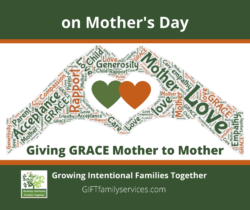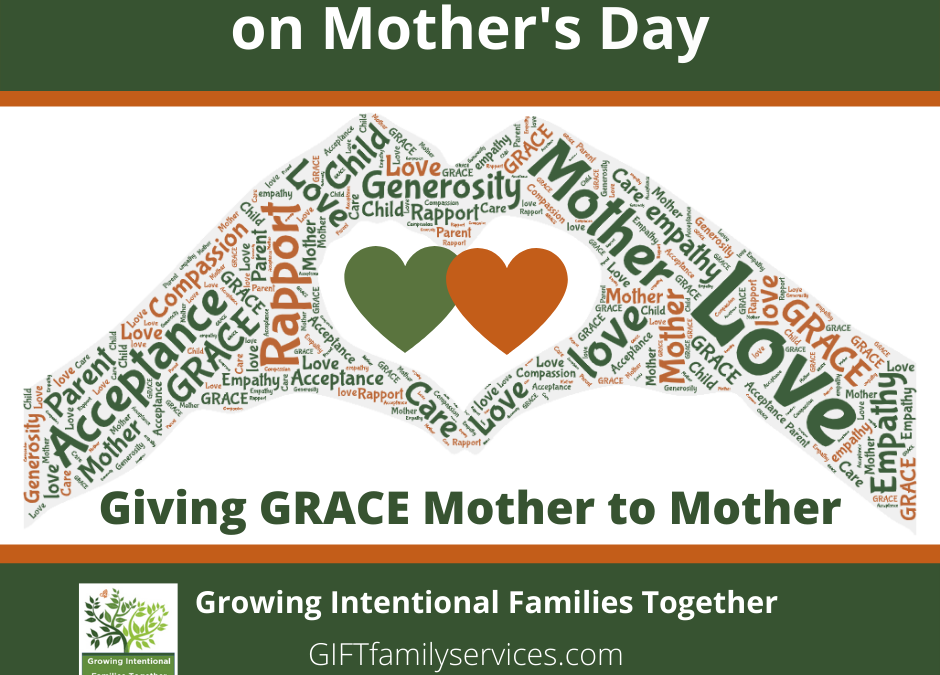 In our culture, we celebrate motherhood and moms. If you are a mother, On Mother’s Day, most likely your family may honor you with gifts. Whether these gifts are large or small, inexpensive or costly, handmade by little ones or purchased, you will treasure the love and appreciation that these gifts represent. As adoptive moms, we might be especially grateful to be mothers. We can glow with pleasure and pride. Our hearts may overflow with emotion.
In our culture, we celebrate motherhood and moms. If you are a mother, On Mother’s Day, most likely your family may honor you with gifts. Whether these gifts are large or small, inexpensive or costly, handmade by little ones or purchased, you will treasure the love and appreciation that these gifts represent. As adoptive moms, we might be especially grateful to be mothers. We can glow with pleasure and pride. Our hearts may overflow with emotion.
Sadly, for some women, Mother’s Day is bittersweet, even heartbreaking. Women who have struggled to become pregnant wrestle with profound sadness. Mothers who have lost a child ache with shattering grief and longing. Some mothers may struggle on this day because they find themselves unacknowledged by or estranged from their children. Another group of mothers is often forgotten on this day: First Mothers.
On Mother’s Day, we as adoptive parents will of course think of our children’s first mothers. Some of us may honor them in some way, by lighting candles or–if there is a relationship–by sending a card or gift.
One of the best ways we can maintain a healthy relationship with our adoptive children’s birth mothers is to acknowledge–even if only privately, the complex emotions first mothers most likely experience on Mother’s Day. Whether children were removed or relinquished, research has shown that almost all birth moms struggle with life-long grief, shame, and depression. Contrary to persistent cultural belief, birth mothers do not forget or get over the loss of their children. If and when they have other children, it intensifies their grief and reawakens their feelings of guilt and worry. Even in open adoptions, these emotions occur.
We invite you to hold your children’s birth mothers with kindness. From one mother to another give them GRACE. Think of this grace as both literal and also as an acronym in which the letters mean.
GRACE. Think of this grace as both literal and also as an acronym in which the letters mean
- G = Generosity,
- R = Rapport,
- A = Acceptance,
- C = Compassion
- E = Empathy
Let’s start with Generosity.
While we delight in the attention and affection of our children, let’s recognize that most birth mothers wish their circumstances had been different and that they had been able to parent their children. Every Mother’s Day, they are reminded of their loss. Whenever we have the opportunity to be generous in thought, heart, and words, let us take it.
Rapport
Let’s think about our own fears for a moment. Fear of rejection by our children. Fear that they won’t bond and attach to us. Fear that we aren’t good enough. Fear that when they grow up, they will choose their birth parents over us. Those are just a few of the fears commonly held by adoptive parents. These powerful emotions can get in the way of creating rapport with our children and their birth parents. Most birth mothers wrestle with similar worries. As we also know, our kids struggle with similar fears regarding rejection, permanence, and acceptance.
When our children’s birth mothers are not seen as adversaries or competitors, we can connect with them through what we have in common: personal fears and insecurities, concerns about the permanency of our relationships and attachments with our children, and most importantly love for our children.
Acceptance
Viewing our children’s birth moms with acceptance means that we understand they are a permanent part of our children even if their only presence is their shared DNA. If we have an open adoption relationship, we know our children’s birth mothers as individual people. We also accept that our children value both of their moms. We refrain from suggesting either subtly or overtly that they must prefer us over their birth mother. Instead, we love our children enough to honor their connection to and need for their birth mothers.
Compassion
As adoptive parents, we stand outside of our children’s birth parents’ experience. Some of us may know more than others about the circumstances that led to adoption. Some of us may have been present at their birth. However much or little we know, we can trust that first mothers have gone through pain, some of which may not be known to us. At the core level, this is the reality that birth moms live. Their child will live a life apart from them. Whether they are in an open or closed adoption, regardless of how engaged or disengaged they are, their child will be loved and parented by someone else. So, when our kids wish to talk about their moms and our self-doubt and fears might be triggered, let us respond to their birth moms with deep compassion. Let us remind ourselves that just as we can love more than one child, our children also are capable of loving us and their birth mothers.
Empathy
Remember the electrifying excitement that filled us when we got “The” phone call about our children? Sleep became impossible. Those who knew and loved us shared and amplified our joy and anticipation. Yet for the birthmothers of our children, there most likely was no celebration, and no gathering of friends and family to welcome the new baby. If we adopted older children instead of an infant, their birth mothers faced a similar absence of festivities and excitement. In that case, the mood was heartbreak and sadness.
The reality of adoption is that it is the ultimate both/and experience. Before our adopted family is formed a birth family is shattered. Our children now belong to two families. While we feel joy, their birth mothers feel loss, grief, and sadness. Certainly, in the midst of our great blessings and happiness as mothers, we can muster deep empathy for our children’s birth mothers and the difficult journey that is life as a birth mother. When we treat their birth mothers with respect, kindness, and GRACE –not only on Mother’s Day but also every day–we are loving that part of our children which originated in their birth mothers and will continue to be part of them forever.
Happy Mother’s Day!
__________________________
- Call us at 1-800-653-9445
- Listen to our podcasts: Adoption Matters: Real People. Real Life. Real Talk and Essentials of Adoption Attuned Parenting
- Watch our YouTube channel
- Read Books written by our coaches
- Click to learn more about Adoption Attuned Certified coaching!



